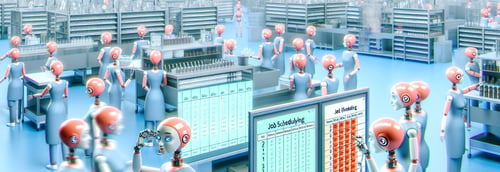Cognitive Automation in Job Scheduling
Production planners are the conductors orchestrating the symphony of processes in pharmaceutical manufacturing. Their task is not merely about arranging tasks on a timeline but navigating a labyrinth of variables—from raw material availability to regulatory requirements—all while optimizing resources and minimizing costs. The emergence of cognitive automation in job scheduling heralds a new era, promising to revolutionize the way planners operate, enhancing productivity, agility, and ultimately, patient care.
In this blog, we look into the transformative potential of cognitive automation in job scheduling, particularly in the context of pharmaceutical manufacturing. Moreover, we explore how integration between leading scheduling solutions like PlanetTogether and enterprise resource planning (ERP) systems such as SAP, Oracle, Microsoft, Kinaxis, and Aveva can amplify these benefits, creating a seamless ecosystem of efficiency and insight.

Cognitive Automation in Job Scheduling
Cognitive automation represents the amalgamation of artificial intelligence (AI), machine learning (ML), and advanced analytics to mimic human thought processes and decision-making. In the realm of job scheduling, cognitive automation transcends traditional rule-based approaches, leveraging historical data, real-time insights, and predictive analytics to optimize scheduling decisions dynamically.
Imagine a scenario where a production planner needs to reschedule manufacturing batches due to a sudden supply chain disruption. Cognitive automation can swiftly analyze various factors—such as equipment availability, workforce capacity, and regulatory constraints—to propose the most efficient course of action, all while considering the broader operational context.

The Advantages of Cognitive Automation
Enhanced Decision-Making: Cognitive automation augments human decision-making capabilities by processing vast datasets and identifying patterns that may elude manual analysis. This enables planners to make informed decisions quickly, even in the face of uncertainty.
Optimized Resource Utilization: By dynamically adjusting schedules based on real-time data, cognitive automation optimizes resource utilization, minimizing idle time and reducing bottlenecks. This not only improves operational efficiency but also maximizes the ROI on assets.
Adaptability and Agility: In today's volatile business environment, adaptability is key to success. Cognitive automation equips production planners with the agility to respond swiftly to disruptions, whether it's a machine breakdown or a change in market demand.
Continuous Improvement: Through iterative learning, cognitive automation continuously refines scheduling algorithms, incorporating feedback from past performance to drive ongoing improvement. This evolutionary approach ensures that scheduling decisions become increasingly accurate and aligned with business objectives over time.


Integration: Bridging the Gap Between Planning and Execution
While cognitive automation holds immense promise, its full potential can only be realized through seamless integration with ERP systems and other enterprise applications. In the realm of production planning, this integration is crucial for ensuring that scheduling decisions align with broader business goals, encompassing inventory management, procurement, quality control, and regulatory compliance.
Leading scheduling solutions like PlanetTogether offer advanced features for optimizing job schedules, taking into account various constraints and objectives. However, to harness the full power of these capabilities, integration with ERP systems is essential. Let's explore how integration with prominent ERP platforms enhances the effectiveness of cognitive automation in job scheduling:
SAP: Integration with SAP enables real-time data exchange between production planning and other core business functions such as procurement, inventory management, and finance. This integration streamlines processes, eliminates data silos, and provides planners with a holistic view of operations, facilitating better decision-making.
Oracle: By integrating with Oracle ERP, scheduling solutions can leverage Oracle's robust database infrastructure and analytical capabilities. This integration enables seamless data synchronization, ensuring that planners have access to the latest information for making scheduling decisions.
Microsoft Dynamics: Integration with Microsoft Dynamics allows for tight integration between production planning and other Microsoft applications such as Power BI and Azure. This synergy enables advanced analytics and reporting, empowering planners with actionable insights for optimizing schedules and driving continuous improvement.
Kinaxis: Integration with Kinaxis extends the capabilities of scheduling solutions by integrating with Kinaxis RapidResponse, a leading supply chain planning platform. This integration enables end-to-end visibility and collaboration across the supply chain, enabling planners to make more informed decisions and respond rapidly to changing conditions.
Aveva: Integration with Aveva's portfolio of industrial software solutions enhances scheduling capabilities by incorporating real-time process data and digital twin technology. This integration enables planners to simulate various scenarios and assess the impact of scheduling decisions on overall production performance.
In pharmaceutical manufacturing, where every decision carries profound implications for patient health and well-being, the adoption of cognitive automation in job scheduling represents a watershed moment. By harnessing the power of AI, machine learning, and advanced analytics, production planners can transcend traditional limitations, optimizing schedules with unprecedented speed, accuracy, and agility.
Moreover, integration between leading scheduling solutions like PlanetTogether and ERP systems such as SAP, Oracle, Microsoft, Kinaxis, and Aveva amplifies these benefits, creating a cohesive ecosystem of efficiency and insight.
As pharmaceutical manufacturers embark on this transformative journey, embracing cognitive automation and seamless integration, they pave the way for a future where innovation, efficiency, and patient care converge seamlessly.
Are you ready to take your manufacturing operations to the next level? Contact us today to learn more about how PlanetTogether and integrated scheduling solutions can help you achieve your sustainability goals and drive success in the pharmaceutical industry.